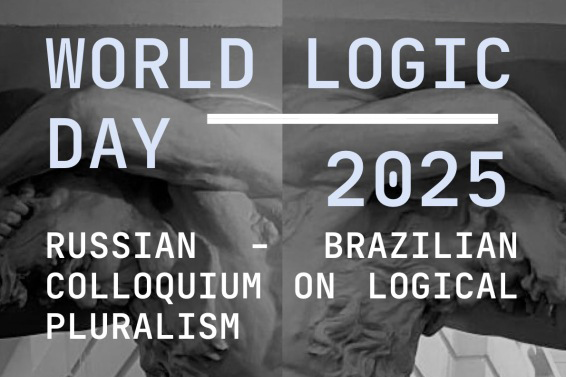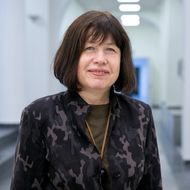HSE and University of Campinas Celebrate World Logic Day Together

On January 15, 2025, the Russian-Brazilian Colloquium on Logical Pluralism was held at the HSE International Laboratory for Logic, Linguistics and Formal Philosophy to mark World Logic Day. This event was part of the joint project ‘Pluralistic Perspectives on Logic and Formal Philosophy,’ implemented by the laboratory and the Centre for Logic, Epistemology and the History of Science at the University of Campinas (Brazil) under the International Academic Cooperation competition.
Elena Dragalina-Chernaya, Head of the International Laboratory for Logic, Linguistics, and Formal Philosophy and professor at the HSE School of Philosophy and Cultural Studies, spoke about the colloquium, which brought together scholars from different countries, disciplines, and generations.

Elena Dragalina-Chernaya
‘This year marks the seventh celebration of World Logic Day. We first observed it on January 14, 2019, when our laboratory became one of the organisers, inviting scholars from the departments of logic at Moscow State University and the RAS Institute of Philosophy to HSE to discuss the prospects of formal philosophy. Today, we celebrate World Logic Day as part of an international research team uniting mathematicians and philosophers from HSE and the University of Campinas in Brazil.
The interdisciplinary nature of modern logic, which finds applications in mathematics, philosophy, linguistics, psychology, and other cognitive sciences, as well as in any field dealing with argumentation and decision-making under uncertainty—ranging from management to social networks and neural networks—makes it a significant public asset. This was recognised when UNESCO added World Logic Day to its calendar of international days in 2020. In 2025, scholars from over 100 academic centres across Europe, the Americas, Asia, and Africa participated in the celebration. As in 2019, Russia and Brazil led in the number of participating academic institutions.
The date of January 14 for World Logic Day was chosen as a tribute to two great logicians of the 20th century: Alfred Tarski, born on this day in 1901, and Kurt Gödel, who passed away on this day in 1978. These scholars not only demonstrated the effectiveness of formal logical methods in diverse fields—from mathematics and computer science to philosophy and even theology—but also, through their famous incompleteness theorems, precisely defined the limits of the expressive and deductive capabilities of formal systems. Developing Gödel's and Tarski's ideas, logic cannot help but reflect on its own assumptions, foundations, and prospects. Logic, which has been the foundation of rationality and the unity of scientific knowledge since antiquity and became a driver for artificial intelligence in the 21st century, is now characterised by a pluralism of formal systems. This key feature of modern logic and the formal philosophy based on its methods became the focus of our joint project with our Brazilian colleagues. Like the project as a whole, the colloquium dedicated to celebrating World Logic Day brought together scholars from different countries and disciplines, as well as—equally importantly—from different generations. We discussed new results in the field of non-classical logics achieved by project participants, including both internationally renowned scholars and early-career researchers, such as winners of the 2024 HSE Student Research Paper Competition in mathematics and philosophy.’
See also:
Viva o Brasil!: HSE University–St Petersburg Hosts Festival of Brazilian Culture
HSE University–St Petersburg wrapped up International Partners' Week with a lesson on Portuguese, a workshop on the dances of various Brazilian regions, a lecture about one of the most popular Brazilian musicians and a live performance by his devotees. Organised by the Bachelor’s programme in Media Communications, the 'Viva o Brasil!' festival invited students to explore the culture of one of the largest countries in Latin America.
First Lady of Brazil Visits HSE University
On May 7, Janja Lula da Silva—the First Lady of Brazil and a prominent advocate for sustainable development who initiated the Global Alliance Against Hunger and Poverty—visited HSE University. She held a meeting with HSE University Rector Nikita Anisimov, where they explored promising avenues for strengthening Russia–Brazil collaboration in science and education. HSE University also hosted a round table discussion titled ‘The Global Alliance Against Hunger and Poverty as a Key to Modern International Cooperation,’ featuring Janja Lula da Silva as a distinguished guest.
‘Brazilians and Russians Share a Unique Connection’
Tobias Vilhena de Moraes is a historian working at Museu Lasar Segall inSão Paulo, Brazil, and a faculty member of the Institute of Philosophy and Human Sciences at the University of Campinas. He is now working on a master’s degree at HSE University-St Petersburg.
‘The Defence Was Both Interesting and Nerve-Wracking’
Ana Livia Araujo Esteves, from Brazil, lecturer at the HSE School of International Regional Studies, has recently defended her PhD at HSE University. In her interview with the HSE News Service, she talks about her research into Brazilian–Russian relations, the difficulties of the thesis defence process, and her further plans in academia.
Bringing Maths and Philosophy Together: Russian-Brazilian Project Explores Logical Pluralism
In late October and early November, HSE University hosted the Autumn School on ‘Logic and Formal Philosophy’ and a conference on logical pluralism as part of a collaborative project uniting Russian and Brazilian philosopher-logicians and mathematician-logicians. The project’s leaders and participants, Elena Dragalina-Chernaya, Itala Loffredo D'Ottaviano, Marcelo Esteban Coniglio, and Evandro Luis Gomes, shared their insights about the initiative.
‘Philosophy Is Thinking Outside the Box’
In October 2024, Louis Vervoort, Associate Professor at the School of Philosophy and Cultural Studies of the Faculty of Humanities presented his report ‘Gettier's Problem and Quine's Epistemic Holism: A Unified Account’ at the Formal Philosophy seminar, which covered one of the basic problems of contemporary epistemology. What are the limitations of physics as a science? What are the dangers of AI? How to survive the Russian cold? Louis Vervoort discussed these and many other questions in his interview with the HSE News Service.
HSE University Negotiates to Launch Joint Projects with Leading Universities in Brazil
In the framework of the academic mission to Latin America, HSE University-St Petersburg has negotiated to launch joint projects with leading Brazilian universities. Thus, with the University of São Paulo, the first in the QS ranking among Brazilian universities, HSE plans to carry out joint research aimed at supporting biodiversity, developing biotechnologies and solving ecological and social issues.
HSE University to Expand Cooperation with Brazilian Universities
On October 14, 2024, International Partnership Day Russia–Brazil took place at HSE University. The event was organised in collaboration with the Brazilian Embassy in Moscow and marked the first Brazilian academic and scientific mission to Russia, leading to the signing of cooperation agreements between HSE University and four Brazilian universities.
‘It Is Absolutely Necessary for Scholars and Students to Be in Contact with Peers Around the World’
Bruno de Conti, Assistant Professor at the University of Campinas (Unicamp, Brazil), has been cooperating with the HSE School of International Regional Studies for a few years. In his interview with the HSE News Service, he talks about the importance of developing academic cooperation between Russia and Brazil and shares his impressions of HSE University and Moscow.
‘I Am Able to Tell My Students Things That I Always Wanted to Tell People in Russia’
Ana Livia Araujo Esteves, from Sao Paulo, Brazil, is a journalist, a third-year doctoral student of International Relations, and visiting lecturer at the HSE School of International Regional Studies. In her interview for the HSE News Service, she speaks about her motivation to carry out research and teach students in Russia, shares some tips for people from Latin America living in Moscow, and talks about why a dog can be a reason to stay in Russia for just a bit longer.


